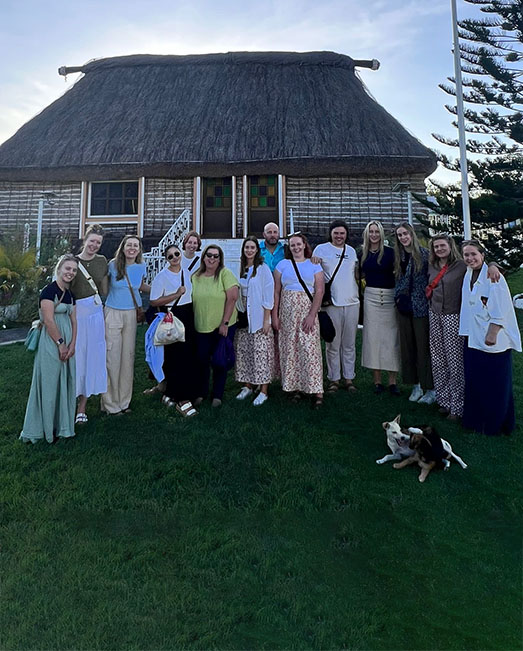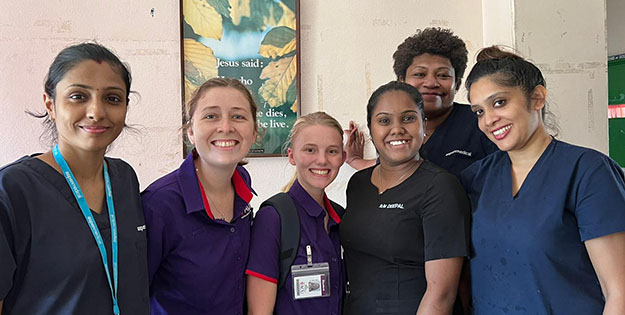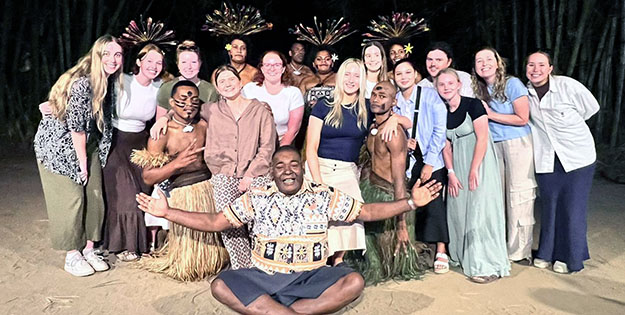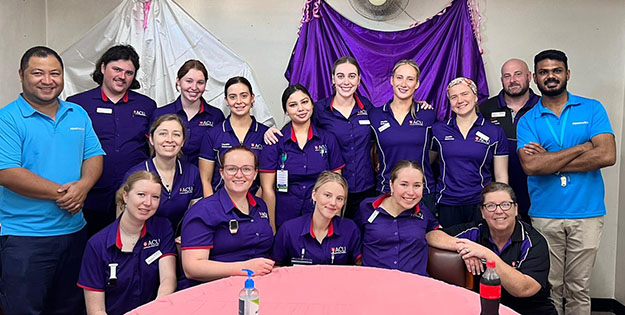Study
Copyright@ Australian Catholic University 1998-2026 | ABN 15 050 192 660 CRICOS registered provider: 00004G | PRV12008
Copyright@ Australian Catholic University 1998-2026 | ABN 15 050 192 660 CRICOS registered provider: 00004G | PRV12008

It was mid-winter on the west coast of Fiji and a cohort of ACU nursing students were stationed at Lautoka Hospital as part of an overseas placement funded by the Commonwealth Government’s New Colombo Plan. The students worked in pairs, rotating across clinical settings and gaining an insight into the challenges of patient care in a Fijian healthcare setting.
Late on a Wednesday afternoon, news filtered through that a busload of school students had been involved in an accident, the vehicle tumbling and landing on its side.
“Suddenly patients started being brought in and there were 78 people with a range of injuries, and students were able to observe the mass casualty triage process,” says Tracy Parrish, Senior Lecturer with ACU’s School of Nursing, Midwifery and Paramedicine.
Accidents involving buses are relatively common in Fiji, and staff at Lautoka Hospital are accustomed to dealing with such emergencies, but it is rare that they involve this many people.
“All hospital staff have a role to play in these circumstances, and they managed it extremely well,” says Tracy, who supervised the short-term international study experience alongside fellow ACU nursing academic, Dale Gorry.
“It was a terrible accident, and our nursing students were quite overwhelmed in the sense that they’d never seen anything like it. But for them to witness and observe this and to see how it was managed, it was a valuable learning experience that might be once-in-a-lifetime.”
Among the students present that day was Brisbane-based nursing undergraduate Sarah Swann, who says she was “amazed by how the staff handled things”.

“They were a well-oiled machine ready for any crisis that walked through those doors,” she says. “The way they train their nurses means that every nurse is competent in every area of the hospital, and that means any nurse can walk into any ward and know what to do. It was amazing to see and ultimately saved lives.”
Sarah was one of 12 Bachelor of Nursing students who travelled to Fiji for the two-week tour, which also included students undertaking the double-degree with a Bachelor of Paramedicine.
The nursing student volunteers split their time between Lautoka Hospital, which is Fiji’s second biggest health facility, and the much smaller Ba Hospital, where they worked solely in the Emergency Department.
While Fiji’s healthcare system has recently improved, faring well in comparison with most of its Pacific neighbours, it still faces pressures.
“The students experienced a different way of nursing in a much lower-resource environment than they’re accustomed to,” says Tracy Parrish, who has been teaching at ACU since mid-2020, and also has extensive practical nursing experience.

“Within the hospital, the culture was very different and a lot more doctor-driven than it is in Australia, where nurses have a bit more autonomy. Alongside that, the students faced many challenges – the language barrier, the different beliefs that patients have about healthcare, the absence of equipment and technology to do tests and investigations – all of this takes the student nurses out of their comfort zone. It forces them to become very resourceful, to work with what they have in front of them.”
Practising nursing in lower-resource setting “made me appreciate how good these nurses really are”, says Sarah, adding that the experience gave her “a new attitude of appreciation and determination”.
“I was constantly amazed by the nurses and how they were able to understand and care for their patients, even when at times, they had so little to give,” she says.
“They were so interested in learning about new and better ways they could improve their practice, [and] even though I went there as a student with very little experience or knowledge, I was still able to share things … and they were so willing to listen.”
Nursing student Lilly Righton says she felt “extremely lucky to participate in such an amazing and eye-opening experience”.
“The nature of the Fijian hospital setting, the kindness and strength of the healthcare staff and the overall supportive aspect of the community … these aspects were unique to anything I had seen within my Australian nursing placements,” says Lilly, who studies at ACU’s North Sydney Campus.

“Adaptability and resourcefulness are skills I am now aiming to incorporate into my nursing repertoire, as I was able to witness first-hand its effectiveness with patient outcomes. I have also become more aware of the extreme privilege of practicing nursing in Australia, and the vast amount of resources we have.”
Repeat study trips to Fiji are being planned for future years, says Tracy Parrish, with an application for additional New Colombo Plan funds in progress. She says she was left with a sense of achievement that not only did students take so much from the experience, but also how the academics and students were able to provide education and support to the Fijian nurses they worked with.
“The fact that students are seeing this as a stepping-stone for their future career in health care tells me this is a worthy project and a partnership we will continue to build,” she says.
“It opened their eyes to things that will serve them well as they go on to work as nurses themselves, whether it’s just observing and experiencing a different culture, or seeing completely different way of practicing nursing. That kind of exposure can only have a positive effect on them.”
Keen to make a positive impact through a career in nursing or paramedicine? Explore the options.
Find out more about the New Colombo Plan.
Copyright@ Australian Catholic University 1998-2026 | ABN 15 050 192 660 CRICOS registered provider: 00004G | PRV12008